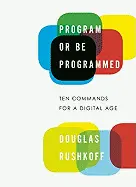
Program or Be Programmed - by Douglas Rushkoff and Leland Purvis
ISBN: 1935928155Date read: 2011-07-20
How strongly I recommend it: 1/10
(See my list of 430+ books, for more.)
Go to the Amazon page for details and reviews.
Maybe I'm just too immersed in this, but everything said here seems to be the most conventional wisdom - nothing I haven't heard. Shame, because I thought it was going to be about teaching the lay-person the importance of programming.
my notes
We scramble to keep up with the never-ending inflow of demands and commands, under the false premise that moving faster will allow us to get out from under the endless stream of pings for our attention.
Instead of our going online to get our email, our email comes to us.
early tests of analog recordings compared to digital ones revealed that music played back on a CD format had much less of a positive impact on depressed patients than the same recording played back on a record. Other tests showed that digitally recorded sound moved the air in a room significantly differently than analog recordings played through the same speakers. The bodies in that room would, presumably, also experience that difference—even if we humans can’t immediately put a name or metric on exactly what that difference is.
information online is stored in databases. A database is really just a list—but the computer or program has to be able to be able to parse and use what’s inside the list. This means someone—the programmer—must choose what questions will be asked and what options the user will have in responding: Man or Woman? Married or Single? Gay or Straight? It gets very easy to feel left out. Or old: 0–12, 13–19, 20–34, 35–48, or 49–75? The architecture of databases requires the programmer to pick the categories that matter, and at the granularity that matters
In a hostile, depersonalized net environment, identity is one’s liability. What were the kids’ weapons against me? My name, my address, my home. What does putting a picture of someone’s house online really imply, after all? We know where you live. We can get you, the real you—while you have no idea who we are.
the anonymous status of people in an online group engenders crowd behavior. They have nothing to fear as individuals, and get used to taking actions from a distance and from secrecy. As a result, they exacerbate digital technology’s most dehumanizing tendencies, and end up behaving angrily, destructively, and automatically. They go from being people to being a mob.
The way to dampen the effects of this problem is not to retreat into anonymity ourselves, but to make being real and identifiable the norm. As in the real world, the fewer people who know each other, the more dangerous the neighborhood.
The real way to “go social,” if they wanted to, would not be to accumulate more page friends or message followers, but rather to get their friends and followers to befriend and follow one another. That’s how to create a culture in a peer-to-peer, networked medium.
Content was never king, contact is.
For the person who understands code, the whole world reveals itself as a series of decisions made by planners and designers for how the rest of us should live. Not just computers, but everything from the way streets are organized in a town to the way election rules (are tilted for a purpose vote for any three candidates) begin to look like what they are: sets of rules developed to promote certain outcomes. Once the biases become apparent, anything becomes possible. The world and its many arbitrary systems can be hacked.